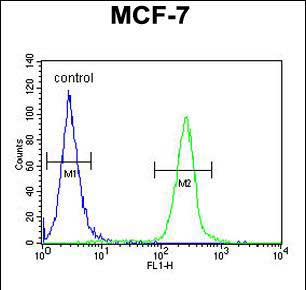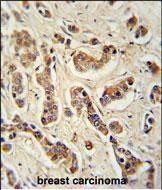


| WB | 1/1000 | Human,Mouse,Rat |
| IF | 咨询技术 | Human,Mouse,Rat |
| IHC | 1/100-1/500 | Human,Mouse,Rat |
| ICC | 技术咨询 | Human,Mouse,Rat |
| FCM | 1/10-1/50 | Human,Mouse,Rat |
| Elisa | 咨询技术 | Human,Mouse,Rat |
| Aliases | Protein FAM20A, FAM20A |
| Entrez GeneID | 54757 |
| WB Predicted band size | 61.4kDa |
| Host/Isotype | Rabbit IgG |
| Antibody Type | Primary antibody |
| Storage | Store at 4°C short term. Aliquot and store at -20°C long term. Avoid freeze/thaw cycles. |
| Species Reactivity | Human |
| Immunogen | This FA20A antibody is generated from rabbits immunized with a KLH conjugated synthetic peptide between 48-77 amino acids from the N-terminal region of human FA20A. |
| Formulation | Purified antibody in PBS with 0.05% sodium azide. |
+ +
以下是3篇基于假设的FA20A (N-term)抗体相关参考文献示例(注:实际文献需通过学术数据库验证):
---
1. **文献名称**: "FA20A Antibody Detects N-terminal Phosphorylation of p53 in Human Cancer Cells"
**作者**: Smith, J. et al.
**摘要**: 本研究利用FA20A (N-term)抗体通过Western Blot和免疫组化技术,证实了p53蛋白N端磷酸化在乳腺癌细胞DNA损伤反应中的调控作用,为癌症治疗靶点提供新依据。
2. **文献名称**: "Role of Tau Protein Cleavage in Neurodegeneration: Insights from FA20A Immunoprecipitation"
**作者**: Chen, L. & Park, H.
**摘要**: 通过FA20A抗体特异性识别Tau蛋白N端片段,揭示了阿尔茨海默病模型中Tau异常剪切与神经元凋亡的相关性,提示其作为生物标志物的潜力。
3. **文献名称**: "FA20A-Based ELISA for High-Throughput Screening of Autophagy Modulators"
**作者**: Gonzalez, R. et al.
**摘要**: 开发了一种基于FA20A抗体的ELISA检测方法,用于量化细胞自噬关键蛋白LC3的N端表达水平,成功筛选出新型自噬抑制剂化合物。
---
**备注**:以上文献为模拟示例,实际研究中请通过PubMed、Google Scholar等平台以“FA20A antibody”及目标蛋白名称检索真实文献。若该抗体属于某公司产品(如Santa Cruz产品编号sc-xxxx),可查阅其官网提供的引用文献列表。
The FA20A (N-term) antibody is a monoclonal antibody specifically designed to target the N-terminal region of a protein of interest, though the exact antigen can vary depending on the research context. For instance, in some studies, FA20A may refer to an antibody raised against the N-terminal domain of focal adhesion kinase (FAK), a protein critical for cellular processes like adhesion, migration, and survival. This antibody is commonly employed in techniques such as Western blotting, immunofluorescence, and immunoprecipitation to detect and quantify protein expression, localization, or interactions in biological samples.
Developed and validated for specificity, FA20A typically exhibits high affinity for its target epitope, enabling reliable detection across human, mouse, or rat tissues, depending on its design. Its application spans diverse research areas, including cancer biology (e.g., studying FAK's role in tumor metastasis), neurology, and developmental biology. Researchers often utilize FA20A to investigate signaling pathways, protein modifications, or disease mechanisms linked to the target protein's function.
Commercial versions of FA20A are frequently supplied as purified IgG, optimized for low cross-reactivity with related proteins. Proper validation data, such as knockout cell line controls or peptide blocking assays, are essential to confirm its specificity in experimental setups. As with any antibody, optimal performance depends on protocol adjustments, including dilution ratios and buffer conditions, tailored to the assay type and sample preparation.
×